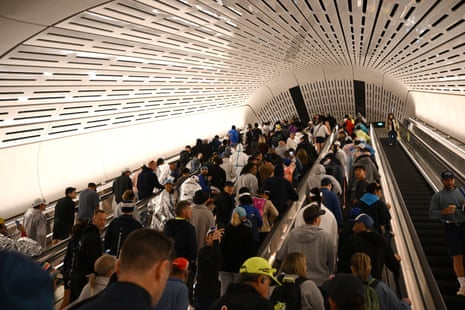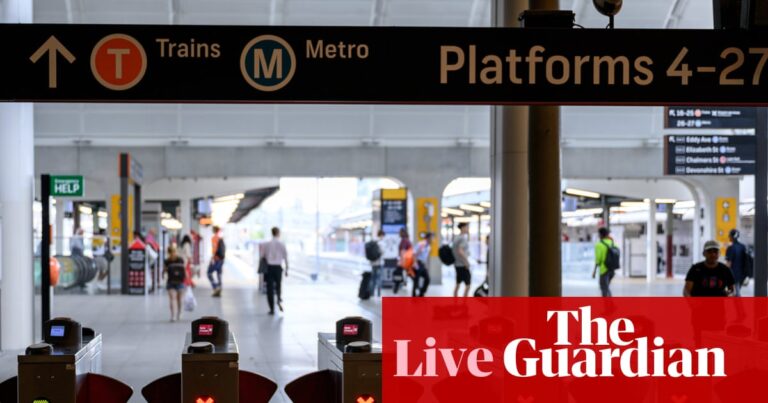Fare evasion budget cost hits $80m in NSW
Luca Ittimani
Fare evaders cost New South Wales public transport a record $80m in the first half of 2025 by dodging payment.
The cost to the state’s budget has doubled in the last four years, as fare dodging rates doubled and ticket prices surged nearly 20% on average.
From 2017 to 2021, Transport for NSW projections consistently found fare evasion was costing the government about $40m every six months. That surged to $65m in mid 2023 and has now hit $78.8m, new estimates from TfNSW show.

For perspective, that’s about a fifth of the passenger revenue Sydney Trains earned in the first half of 2024 or about half the estimated cost of opening the new Woollahra station.
NSW has the highest rate of fare evasion in Australia, with about 8% of trips unpaid for, while Victoria’s rate is just 4% and Queensland’s has plummeted after the rollout of 50c fares. Read about why that’s happened here:
Share
Updated at 04.24 BST
Key events
Please turn on JavaScript to use this feature
Liddle said investigations behind such deaths “take a long time”, but said the long wait was necessary.
She said:
People have said that this process has taken too long.
But we’ve had to wait this period of time to get the brief together and the information together before we move forward. And it’s difficult for people to understand the depth of the briefs that need to be provided.
Share
Leanne Liddle, NT police’s executive director of cultural reform, said White’s death had prompted “immense grief” among his family and across the community.
Liddle said:
I know that there will be anger and hurt in the days and weeks ahead, and I want to appeal for calm and for the respect as a process by the director of public prosecutions runs its course.
Now is the time for patience to allow the independent authorities to do their job, and ensuring that Kumanjayi White’s family and other affected families are given the space and support that they deserve.
Share
Police hold press conference into death of Kumanjayi White
NT police are holding a press conference in Darwin into the death of Kumanjayi White, the Warlpiri man who died in May after being restrained by police in an Alice Springs supermarket.
Share
Updated at 04.40 BST
Victorian exams body review finds lack of leadership and ‘culture of fear’

Benita Kolovos
A “root and branch” review of the Victorian Curriculum and Assessment Authority (VCAA) found the organisation suffers from a lack of leadership, poor budget management and a “culture of fear” among its staff.
The review was ordered by the state education minister, Ben Carroll, after VCAA accidentally published exam content weeks before students sat for them last year.
The debacle led to the chief executive officer’s resignation in November. Following an initial report, released in April, Carroll went on to sack the entire board.
This second, more comprehensive report into VCAA’s culture, structure and operations, which was made public by Carroll on Monday, found the organisation “requires renewal in almost all areas of its operations”. Its author, former Victorian public servant Yehudi Blacher, wrote:
It has suffered from lack of leadership, management and governance failures, a poor organisational culture, inefficient business processes and difficult relationships with the department of education and external stakeholders. It also lacks a sustainable budget and the contemporary technology necessary for the efficient and effective performance of its roles and responsibilities.
The report noted over the past five years the organisation has seen seven substantive and acting CEOs, only one of whom oversaw more than one full examination cycle, creating a “destabilising” effect and “a deterioration of morale and acceptable behaviour”.
At the same time, it has been operating at a structural deficit, with its costs “significantly outstrip[ping]” its funding by between $5m to $55m over the five year-period. Much of this is attributed to staff, with 100 extra employees and more than 1,500 casuals hired.
Share
Updated at 04.25 BST
Coalition says recognition of Palestinian state a ‘hollow gesture of false hope’
Opposition leader Sussan Ley and shadow foreign affairs minister Michaelia Cash issued a joint statement this morning saying they “strongly oppose” the Albanese government’s decision to recognise a Palestinian state.
They said:
Today the Albanese Government extends a hollow gesture of false hope to the Palestinian people. For the Israeli people, it extends a chilling act of concession to the Hamas terrorists who continue to seek their annihilation.
The Coalition opposes this decision and calls for it to be reversed. A responsible Australian government must deal with the world as it is, not as it would wish it to be and it should stand with our most important ally, the United States of America.
Ley and Cash added they remain “committed” to recognition through a “peaceful two-state process” that upholds Israel’s security and an economically viable, democratic Palestine without Hamas.
We are realistic that today is not the day for extending such recognition while Hamas continues to hold Israeli hostages, while it continues to preside over Palestinian territories, and while it continues to launch attacks against Israel.
Share
Updated at 04.09 BST

Patrick Commins
Australia has a productivity problem – can we blame ‘non-market’ sectors like health care and education?
Simon Kennedy, the Liberal deputy chair of the House of Representatives economics committee, is keen to make the connection that a rise in government spending is making the economy less productive.
The RBA’s governor, Michele Bullock, says, yes, “mathematically” the growth of these non-market segments drags on measured productivity growth across the economy – largely because the ABS can’t measure productivity in sectors that don’t have market prices.
But, says Bullock, “don’t correlate that to say in order to get productivity up we have to dramatically (decrease) the size of the non-market sector; I wouldn’t want anyone to make that connection”.
Sectors like aged care and the NDIS “do have lowered measured productivity, but they are all essential parts of an advanced economy,” she says.
But, says Bullock, the structural growth of non-market sectors “does mean we have to look for productivity improvements in other areas if we can get them, so this is the challenge for the economy”.
Share
Updated at 03.45 BST
Fare evasion budget cost hits $80m in NSW

Luca Ittimani
Fare evaders cost New South Wales public transport a record $80m in the first half of 2025 by dodging payment.
The cost to the state’s budget has doubled in the last four years, as fare dodging rates doubled and ticket prices surged nearly 20% on average.
From 2017 to 2021, Transport for NSW projections consistently found fare evasion was costing the government about $40m every six months. That surged to $65m in mid 2023 and has now hit $78.8m, new estimates from TfNSW show.
For perspective, that’s about a fifth of the passenger revenue Sydney Trains earned in the first half of 2024 or about half the estimated cost of opening the new Woollahra station.
NSW has the highest rate of fare evasion in Australia, with about 8% of trips unpaid for, while Victoria’s rate is just 4% and Queensland’s has plummeted after the rollout of 50c fares. Read about why that’s happened here:
Share
Updated at 04.24 BST
Man charged with murder of Crystal Beale
A man has been charged with the alleged murder of 49-year-old Crystal Beale this year, Queensland police have said.
Beale’s body was found in the Brisbane River by a member of the public on 22 February.
Police allege at 8.30pm on Friday 21 February, Beale left a family dinner at a Sunnybank restaurant and travelled with a 49-year-old West End man, who was known to her, in a car to West End.
The 49-year-old West End man was the last to see her when she left the car at 9.30pm on Ryan Street, West End, police said.
They allege the 49-year-old West End man murdered Beale and moved her body into the Brisbane River where it was later found. The man has been charged with one count each of murder (domestic violence offence) and misconduct with a corpse.
He will face Brisbane magistrates court today. Det Insp Wayne Francis said:
It is reprehensible what happened to Crystal. Over the past seven months detectives have been tirelessly investigating every avenue possible to find answers for her family.
We were not going to give up until we could provide these answers and get justice for Crystal.
Share
Updated at 03.12 BST

Patrick Commins
RBA chief points to ‘tariff-related inflation’ in US
There are early signs that Donald Trump’s trade war is leading to higher prices for Americans, the RBA’s governor, Michele Bullock, says.
Answering questions at a regular appearance at a parliamentary committee in Canberra, Bullock said overall it was a “mixed bag” for inflation among peer countries, which showed “we can’t be complacent” about the outlook for inflation overseas:
Some countries are continuing to see inflation coming down, but some are observing continued price pressures – and I think the United Kingdom probably falls into this category.
And the United States, as well, you’re starting to see some signs that there’s tariff-related inflation there, but even abstracting from that, there is some strength in services inflation there.
So I think everyone is comfortable they’ve got inflation back down closer to their targets but I think there are signs that we can’t be complacent.
Share
Updated at 03.22 BST

Benita Kolovos
Victorian government fast-tracks approval of the state’s largest battery storage project
The minister for planning, Sonya Kilkenny, on Monday announced Pacific Green’s $1.3bn Portland Energy Park, in the state’s south-west, has been fast-tracked via the government’s development facilitation program.
The program was designed to speed up housing approvals but was extended last year to include renewable energy projects. At the time, the government said one in five renewable energy project applications were getting caught up in the Victorian civil and administrative tribunal despite eventually being approved, leading to long delays.
Since then, 20 projects totalling more than $6bn have been fast-tracked by the government. These projects no longer have to go through the planning panel process, including third-party appeals at Vcat.
The Portland project includes four 250-megawatt battery ‘parks’ – enough to power 345,000 homes during peak demand – making it the state’s biggest battery and an on-site terminal station to connect the facility to the grid via existing transmission lines.
As part of its application, Pacific Green was required to show the development will be “compliant with conditions regarding biodiversity impacts, bushfire safety, and noise” the government said, while also committing to upgrading nearby roads as part of the works.
Share
Updated at 02.53 BST

Patrick Commins
Higher prices have affected ‘everyone’, Bullock says
“The global environment is particularly uncertain and unpredictable,” Bullock said, adding that the economy and labour market could prove hotter or cooler than expected – which would change the prospect of future rate moves.
She noted that while inflation had come back down from its 2022 peak, prices hadn’t come down and Australia remained a substantially more expensive place to live than a few years ago:
The higher price level has affected everyone – whether you’re paying a mortgage, renting, running a business, or just trying to make ends meet. It’s been especially tough on people with lower incomes and those in more vulnerable situations.
This is why … it’s so important that inflation remains low and stable.
Share
Updated at 02.43 BST


